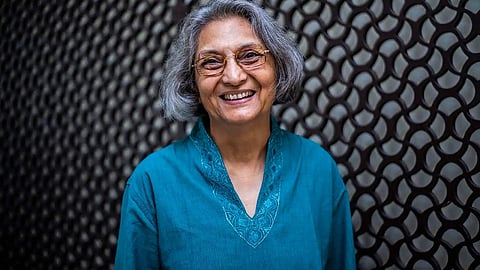
- LIFESTYLE
- FASHION
- FOOD
- ENTERTAINMENT
- EVENTS
- CULTURE
- VIDEOS
- WEB STORIES
- GALLERIES
- GADGETS
- CAR & BIKE
- SOCIETY
- TRAVEL
- NORTH EAST
- INDULGE CONNECT

Apart from the COVID-19 pandemic, Bollywood weddings and fuel prices hike in India, what also ruled the headlines in 2021 was the news that Alia Bhatt was to play the sensationalised character of Ma Anand Sheela (as she is better known). The news also surfaced that Sheela Ambalal Patel (or Sheela Silverman, or Sheela Birnstiel) sent a legal notice to Priyanka Chopra Jonas when she heard that the Quantico star was developing a script based on her life, for the former Rajneesh aide wanted Alia to play her on the big screen.
“I saw the movie Kapoor and Sons and felt Alia Bhatt could play my role. She looked like me when I was young. The film has to be done now. I am getting too old,” she announced from the stage during the conversation about her recent book By My Own Rules organised by Avid Learning at The Royal Opera House in Mumbai. Dressed in a maroon kurta and pants paired with a grey jacket, Sheela looked graceful and poised as she settled into her chair.
Sheela came to the limelight with the immensely successful Netflix documentary series Wild Wild Country which details her story — from being the personal secretary and spokesperson of the godman Rajneesh in 1980 to running his commune, Rajneeshpuram, in the American state of Oregon where she was allegedly involved in a series of controversies and crimes. Later, Bollywood filmmaker Shakun Batra brought the spotlight on Sheela with his Netflix documentary, Searching for Sheela. The series follows her as she travels through India meeting friends and family after 34 years of living in the West.
The wild side
Sheela now lives in Switzerland, where she runs two care homes, Matrusaden and Bapusaden for seniors and people with degenerative illnesses. Born in Vadodara, Gujarat, as the youngest of siblings, Sheela was 16 when she moved to the USA and joined Rajneesh’s commune. She grew up in a close-knit, traditional and simple Indian family. How did she navigate this intense, wild world as a teenager? “We were traditional but not really. We were taught to run after freedom as both my parents were freedom fighters and my father was very clear that he is going to educate all his children. He was very forward in his thinking. He taught us freedom from our childhood and he was the one to introduce me to Rajneesh and J Krishnamurti. So, if anyone needs to be blamed for my wildness it has to be my father,” she says. It is no doubt that she ran the entire commune of Rajneesh in Oregon in an extraordinary way. And now she runs two homes in Switzerland, two in Vietnam and Malaysia. When asked about some of the management skills that she has imbibed and used over the years, she says, “you be the first to take care of the problem before you ask others to do it.” She continues, “what I would not ask my subordinates is what I would not ask of myself. You need to take responsibility and don’t complain without doing something about it. I have applied them in my life and it truly changes the quality of your work.”
Fearless and courageous
There are still continuous judgments, media frenzy and constant finger-pointing for what had happened in the past. But Sheela remains immune to these voices. Her strength comes from knowing her real self. “To be able to know yourself clears out a lot of garbage from the mind. I am not expecting somebody to like me a lot. If they like me I am grateful but if they don’t like me, I will walk away. And if they are annoying me, then also I know how to respond,” she reflects. For a seemingly fearless person who lived her life on her own terms and never gave up on her circumstances, Sheela too had her share of dreary days. “My father trained us to be fearless. I used to travel with my sisters alone when I was 12 years old to Madhya Pradesh to our farms by train. We were taught to use our commonsense and not to be afraid. And if you are afraid, don’t show you are afraid, show that everything is in control,” she recalls. “I never felt scared but sad when I left Bhagwan (godman Rajneesh). There was a deep sadness but that too passed.”
Back in time, she was considered a pop icon and women considered her an epitome of feminism but on the other hand, she was called a criminal, a murderer and someone who went to prison. Still, she navigates her life despite being put into various boxes by society. She says, India was more liberal back in those days and there was freedom of expression. “I know that exercising freedom near Bhagwan was easy because we were all engaged in listening to him and he provoked the idea of knowing ourselves. When you have clear guidance you move forward. These days, there is no clear guidance,” she opines in conclusion.
priyanka.chandani@
@MinksChandani